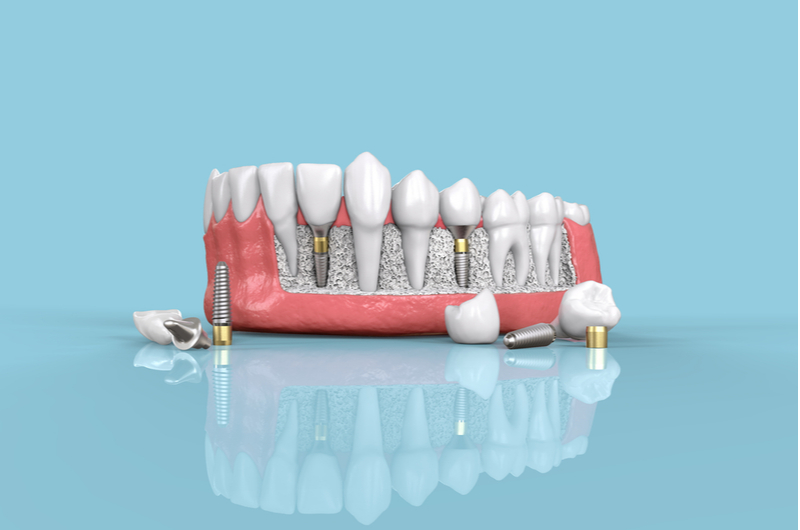Get Help For Your Dental Implants With These Grants
Dental implants are high quality false teeth. Implants are expensive, but there are grants, loans and other programs to pay for dental implants.
If you are missing a tooth, it is important for your dental health to get a replacement. There are multiple teeth replacement procedures available, but most patients prefer getting dental implants. Dental implants are made of stronger materials than other replacement teeth, making them easier to adjust to and manage. Dental implants are also designed to mimic real teeth, making them more comfortable and giving them a better appearance. Before you get dental implants, you must get a titanium base installed along your jaw. The base keeps the implants from slipping, allowing you leave the implants in your mouth permanently.
While there are many benefits to installing dental implants, many patients struggle with the cost. Because dental implants are classified as a cosmetic procedure, it is much harder to get insurance to help out with payments. As a result, you are forced to pay for dental implants out of pockets, which typically costs between $3,000 and $4,500 to install. If you want to get dental implants but are concerned about the costs, there are several options to get a reduced price.
Cosmetic Dentistry Grants (CDG) Program
The CDG program provides financial assistance for most dental procedures, including cosmetic treatments. Some of the other services the program helps with are dental veneers and bonding, installing crowns, inlays and onlays and whitening procedures. The CDG not only provides financial assistance with a number of dental procedures, but it has less eligibility requirements than other dental grants. Even if you do not meet the basic grant requirements, you may qualify for a partial grant to pay for your dental implants.
While there are few eligibility requirements, there are several steps to the application process. You must submit an initial application online through the CDG website. The initial application only asks for basic information, such as the procedure you want and why you need it. If this initial application is accepted, you must meet with an approved dentist for a free consultation. During the consultation, the dentist confirms you need the treatment and determines whether you are a good candidate for dental implants.
If you are planning to get dental implants, you must go through a consultation to determine your jaw strength. By using the free consultation, you are saving even more on the total cost of your implants. If you are unable to get dental implants, there may be additional procedures or treatments your dentist recommends to strengthen your jaw. It is not uncommon for patients to initially be rejected for implants. You are allowed to use funds from your CDG to help with any costs to strengthen your jaw.
If your consultation goes well, the next step is to submit a formal grant application. Your dentist submits the application on your behalf. It normally takes between one to three months to get a response. If your application request is approved, you and your dentist must sign an agreement confirming the funds will only be used for your treatment. You are not required to use the same dentist who performed your consultation, but it must be a dentist approved by the CDG program.
Once you sign the agreement, the funds are released directly to your dentist. This is an additional security measure to ensure the grant is only used for the dental procedure. If you previously paid any money to your dentist as part of the procedure, you can retroactively use your grant, receiving a refund from the dental office. Once you are approved, you have three months to use your CDG.
Smile Grant Program
The Smile Grant Program has several financial options to help with dental procedures. Unfortunately, full funding is only available if you are getting consultation work or x-rays. Smile grants still provide generous discounts on other procedures, including dental implants. Most applicants receive between 20 to 50 percent off the costs of their procedure. Several factors determine your discount, including your total income, whether you have dental insurance coverage and the total cost of the procedure. During the application, you are required to provide financial information and explain why you need dental implants.
Dental Lifeline Network
Another option for financial assistance is the Dental Lifeline Network. The Dental Lifeline Network is only available to select applicants. You must either be over the age of 65 or have a permanent disability. If you are medically compromised, you can still submit an application, if you do not have the available funds to purchase dental implants. In order to receive a financial grant from the network, you must exhaust all of your insurance options.
Discount Dental Plans
Another way you can pay for dental implants is through a discount dental plan. These plans are similar to insurance policies, but provide limited coverage. Your plan only lasts for a year, but you receive substantial discount on any dental costs. This is a good option for dental implants because it takes multiple appointments to install the implants. There are also several follow up appointments after the implants are installed.
Dental Loans
If you are unable to qualify for a dental grant, you can apply for a dental loan. Dental loans are almost identical to personal loans, but the funds are exclusively used for dental costs. The biggest difference between grants and loans is you must pay back the funds you borrow from a lender. Your eligibility for a dental grant and the total amount you can borrow is largely determined by your credit score. This also affects your payment plan and interest rates. You can apply for a dental loan through most banks and credit unions. There are also some financial companies such as CareCredit, Lending Club and Lending Tree that provide dental grants.
Health Savings Accounts (HSA) and Flexible Spending Accounts (FSA)
If you plan ahead, you can use both HSAs and FSAs to save on dental costs. HSAs are only available from a high-deductible health plan. Each year, you are allowed to contribute to your account, up to a maximum amount. Whatever you contribute is deducted from your taxes. You can use the money saved in this account for medical procedures, including dental implants.
FSAs are similar to HSA. The biggest difference is an FSA is only available from your employer. Each month, a percentage of your paycheck is applied into your account.


